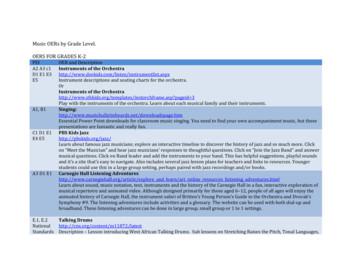Biomedical Technologies: Design & Development - Rutgers Global Health .
Biomedical Technologies: Design & Development 1. INTRODUCTION: This is an interdisciplinary course that introduces students to the field of biomedical technologies for to address global healthcare challenges. Students learn fundamental concepts in the areas of bioelectrical engineering, point-of-care sensors, fabrication, micro/ nano technologies, microfluidics, data processing, and global healthcare applications. The course will provide a detailed background on the engineering principles used for biosensor development. Sensor fabrication and characterization of the point-of-care biosensors will be taught. The course also will also introduce students to the onchip sample processing, surface functionalization techniques, label-free detection of biomolecules, instrumentation, and data processing. Course will highlight the development of personalized predictive systems for health care using machine learning techniques. Course also includes case studies of point-of-care sensors. The course is cross listed for senior undergraduates and starting graduate students. 2. LOGISTICS: Instructor: Dr. Umer Hassan Credits: 3 Lectures: TBD Contact info: Email: umer.hassan@rutgers.edu Office: EE-215 Ph: (848) 445-2164 Office hours: TBA 3. COURSE MATERIALS: 1. 2. 3. 4. All lecture slides will be posted on Canvas for your access. No textbook is required Supplementary notes/ papers will be provided by the instructor A personal computer/ laptop is required to view the lectures and complete any assignments. 4. PRE REQUISITIES: No specific pre-requisites are needed for school of engineering (SoE) senior undergraduate and graduate students. Course is designed toward engineering students, senior undergraduate or beginning graduate students. Syllabus provided to Rutgers Global Health Institute in April 2022. Please check with department and/or instructor for official version.
5. COURSE LEARNING/ EDUCATIONAL OBJECTIVES: A. B. C. D. E. F. G. H. I. Students will be exposed to the interdisciplinary areas and global health needs. Students will learn fundamental biosensing principles in point-of-care sensors. Students will learn design, development, and characterization of biosensors. Students will learn assay integration for a point-of-care sensor. Students will learn biochemical, bioelectrical, structural, optical, and acoustic sensing methodologies. Students will learn bottom-up approach of a biosensor design for diagnostic applications. Students will learn the instrumentation, data processing, and machine learning integration with sensors. Students will learn the commercialization and regulatory approaches for the biosensors. Finally, course aims to instill “need-driven” based critical thinking in students to solve biomedical challenges using engineering principles. 6. TOPICS COVERED: Tentative weekly schedule and topics are given below: Week # 1 2 3 4 5 6 7 Topics A. B. C. A. B. A. B. C. A. B. A. B. A. B. C. A. B. Course overview Introduction to unmet needs in the global healthcare Role of biomedical technologies in solving global health challenges Introduction to point-of-care biomedical technologies Richard Feynman lecture & intro to micro-nano technologies Role of biomarkers in sensing Quick review of biology (cells, proteins, DNA/RNA) Disease progression (e.g., HIV/AIDS and Cancer) Stepwise process for a modular design of a point-of-care (POC) biomedical sensor Case study Microfabrication techniques (SU-8 lithography) Rapid prototyping and additive manufacturing Biological samples collection Relevant biomarkers for biomedical technologies Biosafety practices Introduction to microfluidics Unique architecture design for on-chip sample processing Syllabus provided to Rutgers Global Health Institute in April 2022. Please check with department and/or instructor for official version.
8 9 10 11 12 13 14 C. A. B. A. B. A. B. C. A. B. A. B. A. B. A. B. Simulations in COMSOL Electrical biosensing principles Electrochemical, conductance, and impedance sensors Optical biosensing principles (fluorescence detection & Raman spectroscopy) Fluorescence Microscope and Flow Cytometer Specific leukocytes capture and counting Surface functionalization and proteins quantification DNA identification and PCR assays Instrumentation design and signal processing Biostatistics to evaluate performance of biosensors Multiplexing biomedical technologies Human centered design of biomedical products for LMIC Clinical data integration with biosensors Machine learning for predictive healthcare prognostics Commercialization of biomedical technologies FDA regulatory approaches for medical devices 7. STUDENT ASSESSMENT AND COURSE GRADING: 5 mini-exams (5 x 5% 25%) 6 homework assignments (6 x 5% 30%) 1 class project (25%) 1 presentation (20%) 7.1.1. Details for class project: Group of 2 students Project should focus on developing a new biosensor for a global healthcare application. Students are required to finalize the ‘project ideas’ by Week 7 of the course. Group formation: Students will have a choice to select the group partner. If any student needs help finding a partner, instructor can help make the group assignment. Project topics: You will be provided an example list of the project ideas. Students are highly encouraged to think their own ideas (i.e., which they are more excited/ motivated about based on social need, technology driven etc.). Discuss your ideas with the instructor in office hours/ email to receive feedback before finalizing. 7.1.2. Rubric for class project reports (25% of total grade): Global health relevance and comprehensive literature review (5%) Syllabus provided to Rutgers Global Health Institute in April 2022. Please check with department and/or instructor for official version.
Experimental Design (12%), – Sensor/ approach design e.g., biochip schematic (5%) – Tentative fabrication protocol for the biosensor (5%) – List of experiments and optimizations needed (5%) Final project report (5%) – 8 pages, single spaced, 11-point font, with separate references Timely submission of all deliverables (3%) Project deliverables: Following deliverables will be due by the first lecture of the following weeks. Deliverable # 1 Week 7 Send the final project titles/ ideas and group members names Deliverable # 2 Deliverable # 3 Deliverable # 4 Week 9 Week 12 Week 14 Send literature review Send experimental design section of the project Final report submission 7.2. Class presentations rubric (20% of grade): Group formation: Students can do the class presentation in the group of 2. Students will have a choice to select the group partner. If any student needs help finding a partner, instructor can help make the group assignment. Timings: Your presentation should be 9-10 min in time. We will reserve another 2-3 min for a quick Q/A session. Mode: You will record your video presentations and submit on canvas. The Q/A will be done on the ‘Discussions’ section of the canvas. Presentation slides (Content*) Actual presentation (Delivery**) Q&A (How effectively you answered questions) Attendance in all students’ presentations Submission of deliverables 5% 4% 4% 3% 4% * Content: Significance of topic, literature review, sensor/ technology design, figures of merit, limitations/ areas of improvement etc. ** Delivery: Following time limits, every student must participate etc. Syllabus provided to Rutgers Global Health Institute in April 2022. Please check with department and/or instructor for official version.
Presentation deliverables: Following deliverables will be due by the first lecture of the following weeks. Deliverable # 1 Deliverable # 2 Deliverable # 3 Deliverable # 4 Week 7 Week 10 Week 13 Week 14* Send final presentation title & group members names Send first version of slides and receive feedback Send final version of slides & present Send revised version of slides after presentation * optional, if you want to earn 2% of the lost presentation grade back 8. COURSE POLICIES 8.1. Policy on late work submission Late work is eligible for 50% of original points (applicable to first late submission and only assignments) 8.2. Extension of assignment deadlines Deadline extension to submit any assignment can be granted due to the following reasons: Documented illness Varsity athletic commitments Observance of religious holidays Note: Extension request (an email to instructor) will be sent prior to the deadline except for medical emergencies. 8.3. Disability accommodation: In case of any disabilities with requirement of any special accommodation request in the class, instructor encourages the student to Rutgers Office of Disability Services (ODS; ods.rutgers.edu) for a Letter of Accommodation (LOA). On receipt of the LOA, instructor will implement the ODS accommodation recommendation for the student. 8.4. Academic integrity policy: It is recommended that students will review Academic Integrity Policy. Any violations to this policy will be reported to Office of Student Conduct (New Brunswick). Syllabus provided to Rutgers Global Health Institute in April 2022. Please check with department and/or instructor for official version.
Policy: http://nbacademicintegrity.rutgers.edu Syllabus provided to Rutgers Global Health Institute in April 2022. Please check with department and/or instructor for official version.
biomedical challenges using engineering principles. 6. TOPICS COVERED: Tentative weekly schedule and topics are given below: Week # Topics 1 A. Course overview B. Introduction to unmet needs in the global healthcare C. Role of biomedical technologies in solving global health challenges 2 A. Introduction to point-of-care biomedical technologies
PSI AP Physics 1 Name_ Multiple Choice 1. Two&sound&sources&S 1∧&S p;Hz&and250&Hz.&Whenwe& esult&is:& (A) great&&&&&(C)&The&same&&&&&
Argilla Almond&David Arrivederci&ragazzi Malle&L. Artemis&Fowl ColferD. Ascoltail&mio&cuore Pitzorno&B. ASSASSINATION Sgardoli&G. Auschwitzero&il&numero&220545 AveyD. di&mare Salgari&E. Avventurain&Egitto Pederiali&G. Avventure&di&storie AA.&VV. Baby&sitter&blues Murail&Marie]Aude Bambini&di&farina FineAnna
The program, which was designed to push sales of Goodyear Aquatred tires, was targeted at sales associates and managers at 900 company-owned stores and service centers, which were divided into two equal groups of nearly identical performance. For every 12 tires they sold, one group received cash rewards and the other received
College"Physics" Student"Solutions"Manual" Chapter"6" " 50" " 728 rev s 728 rpm 1 min 60 s 2 rad 1 rev 76.2 rad s 1 rev 2 rad , π ω π " 6.2 CENTRIPETAL ACCELERATION 18." Verify&that ntrifuge&is&about 0.50&km/s,∧&Earth&in&its& orbit is&about p;linear&speed&of&a .
theJazz&Band”∧&answer& musical&questions.&Click&on&Band .
6" syl 4" syl 12" swgl @ 45 & 5' o.c. 12" swchl 6" swl r1-1 ma-d1-6a 4" syl 4" syl 2' 2' r3-5r r4-7 r&d 14.7' 13' cw open w11-15 w16-9p ma-d1-7d 12' 2' w4-3 moonwalks abb r&d r&d r&d r&d r&d r&d ret ret r&d r&d r&d r&d r&d 12' 24' r&d ma-d1-7a ma-d1-7b ret r&d r&d r5-1 r3-2 r&d r&r(b.o.) r6-1r r3-2 m4-5 m1-1 (i-195) m1-1 (i-495) m6-2l om1-1 .
s& . o Look at the poem’s first and last lines (first and last lines may give readers important . it is important to read poems four times. Remind them that the first time they read is for enjoyment; rereads allow them to dive deeper into poems .
PK-2 Next Generation ELA Standards at a Glance . PK-2 Reading Standards (Literary and Informational Text) Review the . PK, K, 1. st, and 2 nd grade ELA introductions for information regarding: guidance and support, range of student reading experiences, text complexity, English language learners/multilingual learners, and students with disabilities. Key Ideas and Details PK K 1 2 PKR1 .























